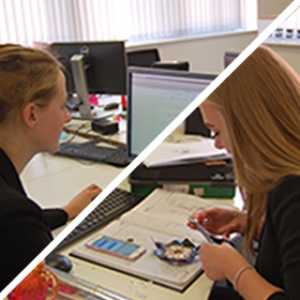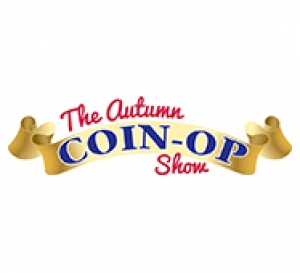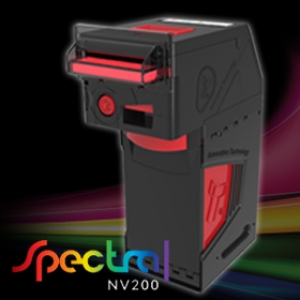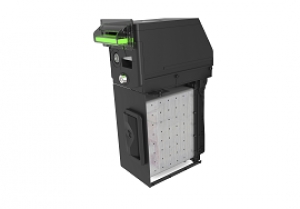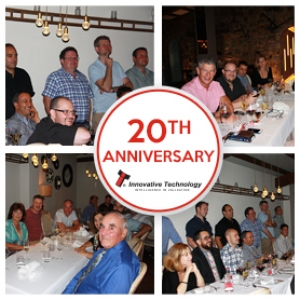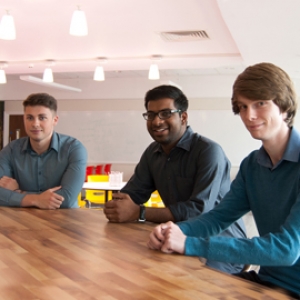News Archive
Categories
Last of the summer interns
During the course of the Summer, we have been catching up with a number of the summer placement students who have, inexplicably, been spending their valuable summer holidays working. Two of these students, Abby Camilleri and Caroline Richardson, are returning from last year. So just why have they decided to come back?
Abby Camilleri
This is my 4th year of summer work experience at Innovative Technology. When I first started here, I viewed as little more than an opportunity to make a bit of extra money, however I learned so much here that I kept coming back.
I have just completed my first year of studying Physics at university, and I believe that my exposure to practical work will help immensely in the coming year of university. In first year, all of the experiments were already set up, so I’ve had to learn how to prepare instruments before I can measure anything. I received a similar boost to my Matlab skills when I was working here last year, and when I was faced with using that program at university, I was way ahead of the rest of the class. I have been working on a high-speed, hyperspectral broadband light source (something simple to begin with!), which aims to capture 1000 frames per second.
While it’s been a worthwhile career experience, it has also been a fun place to work with loads of stuff going on outside of work, such as a company-organised Olympic Games that involved colleagues from offices around the world.
Working here has helped me to realise that I want to follow a career in science, whether that be as a teacher or in a research capacity. I think a lot of work experience roles can often scare away young people from following their passion because they only see a limited perspective of what that career path can offer. Working at ITL, however, was enjoyable throughout and showed me the potential of the Physics degree I am currently studying for.
Caroline Richardson
At the start of the summer, I was tasked with a project involving the creation of test banknotes from huge banks of previous data.
I first applied for a placement at ITL last year, and after a successful interview process I was offered a role here. decided to come back because it was an enjoyable and rewarding experience last year, I also thought I would lose my sanity if I spent the summer doing nothing. Being able to keep my brain running during the summer vacation really allowed me to hit the ground running at the start of the university term, and I hope to do the same this year. Another huge positive compared to other work experience opportunities, is that I really felt as though I was adding value to the company by working here. Rather than simply making tea or scanning documents, I was involved in a project that could potentially revolutionise the way banknote data is utilised at the company, furthermore, my project from last year is still being continued by other people within the Research team.
If I could give one piece of advice to future summer placement students, it would be to always backup your work on a cloud server! I found out about this the hard way, losing some of my work a couple of weeks before I was due to leave. Obviously, I would have preferred to avoid this kind of thing but I was able to redo the section of the project that I had lost much quicker the second time around due to my increased knowledge of the subject. I also think it is vital that people who come into these work experience roles know that they can ask for help at any time. Last year I was perhaps too hesitant to ask when I didn’t understand something fully, but now I’m eager to ask questions to both my supervisors and the rest of the placement students.
I would love to come back next year to gain an in-depth knowledge about an entirely new area of study, and earning a bit of money of the side would of course be a nice little added benefit!
If you are interested in a summer internship at ITl, check out our Careers Page
Looking forward to ACOS
The Autumn Coin-op Show (ACOS), the UK’s largest exhibition in the amusement & coin-op industry, is returning this October. Innovative Technology Ltd. (ITL) and its subsidiary InnoPrint will be participating in the show for the third year in a row, and is set to showcase their entire product range to their industry peers. The Autumn Coin-op show will again take place at Stamford Bridge stadium, the home of Chelsea Football Club from 12th October – 13th October.
ITL and Innoprint will use the opportunity to demonstrate the boundless potential of their ticketing solutions over the two days of the exhibition at stand 20. The SMART Ticket and NV12+ combination banknote validators and ticket printer that serve contrasting ends of the market. The SMART Ticket is designed to handle large volumes of notes, and its unique note in/ticket out maximises cash efficiency for the operator. The NV12+ caters towards customers that have smaller space considerations within their machines due to its compact size.
InnoPrint Development Director, Chris Robinson said “We have been vocal exponents of TITO technology for a number of years, and our cutting-edge products reflect our status in the industry. In addition to presenting our ticketing solutions at a number of exhibitions and tradeshows around the world, we have been hosting our very own ‘TITO exhibition days’ at our UK headquarters. These open days have been instrumental in educating operators about the potential benefits of implementing ticketing systems, and we received a fantastic response from everyone involved. We hope to continue the positive attitude towards TITO with our showing at ACOS this year, which has already established itself as one of the best events to informally chat with industry peers, despite its relatively short existence.”
In addition to the company’s validator products, ITL will be demonstrating their standalone printing solutions – the compact CR-158, and the larger FBF-166 flatbed printer. Chris commented on these two products “Just like our combined validator/printer products, the separate printers can cater towards specific operator needs. The CR-158 is suited to those will less space available in their machines, whereas the FBF-166 would be well-matched to operators who need to dispense large amounts of tickets during a single day.”
ITL has a busy upcoming schedule appearing at a number of Gaming and Retail events over the coming months. ITL will be extending its reach to the Eastern European market at BEGE 2016 in November, and then travelling across the Atlantic to Retail’s Big Show New York at the start of 2017.
Introducing NV200 Spectral – The most technically advanced note validator in its class!
Globally renowned cash handling equipment provider, Innovative Technology Ltd. (ITL) has continued its rapid expansion and is set to introduce a ground-breaking new banknote validator, the NV200 Spectral. The next step in banknote validation equipment will feature incredible sensing technology that has never before been seen in the industry.
In an incredible technological leap, the NV200 Spectral banknote validator is able to capture 100% of a banknote by scanning up to 4.8 million datapoints – a figure that is unmatched by industry competitors. This number is able to be reached due to the full spectral imaging sensors that are built into the validator. The sensors can accurately discern between authentic and counterfeit notes and boast an acceptance rate of new and street grade notes of over 99%.
ITL’s Technology Director, Dr Matthew Strong, said “Incorporating spectral sensors into one of our products has long been a goal held by myself and the Research & Development team. However, until now the technology was not available to meet our ambitions. The optical sensors not only allow us to capture more of the note than ever before but also help us to prevent fraud manipulations. Our unique security feature extraction ability allows us to isolate specific security features within the note and scan them to make 100% sure of the authenticity of banknotes.”
NV200 Spectral retains the unit’s modular design, allowing additional functionalities in the form of add on modules featuring note recycling, ticket printing or a tamper-evident cashbag. Regardless of which modular add-on component is connected to the NV200 Spectral, the unit retains its industry-leading performance. The Spectral version, however, improves on the previous unit’s note-to-note processing speed and is now able to validate notes within two seconds – improving transaction time and operator profitability. The Spectral retains the exact dimensions of its predecessor but is now able to support a 24V power supply.
Matthew continued “The original NV200 was one of our most popular products and in many ways it is difficult to improve upon. However, we’ve managed to build upon our best in class performance and deliver a product that will truly revolutionise the validation industry. There are many times when a new product or feature is overblown but I can honestly say that the Spectral is a game changer. Now that we have been able to harness to power of spectral sensors, we are going to implement this technology into more of our core products to benefit our global customers.”
The NV200 Spectral will continue to support the SMART Payout and SMART Ticket add-on modules, which have been so well-received by our customers. The SMART Payout is a high-quality banknote recycler. The product can store all denominations from a given currency, effectively eradicating coin starvation and reducing the coin float level required to keep machines operational. The SMART Ticket has capitalised on the recent growth in TITO implementation in the Gaming sector, and is designed to provide customers with a printed barcode ticket that can then be exchanged for cash at redemption terminals.
In the last year, the NV200 Spectral has received independent validation from both the European Central Bank (ECB) and the Central Bank of Russia (CBR). Both banks grant approval to validators that can successfully recognise the difference between genuine and counterfeit banknotes. The unit passed both tests with flying colours and was able to find all required security features, correctly identify them, and reject all manipulated notes. Lead Currency Engineer, Ben Wright commented on the success “We are obviously delighted with the outcome, and in particular with the CRB test due its notoriously stringent requirements.
Matthew also added “We will be officially launching the NV200 Spectral at ICE 2017 in London. We are very excited to present such a revolutionary product and we expect the show visitors to be suitably amazed by its next level sensing technology.”
For more information regarding the NV200 Spectral, please visit our Products page
ITL to demonstrate Retail products at International Plus Forum 2016
Innovative Technology Ltd. (ITL), a leading cash-handling technology provider is excited to be exhibiting at the International Plus Forum in Moscow. The Forum will be held at the Sokolniki Exhibition and Convention Centre from 5th to 6th October, and is one of Europe’s largest events dedicated to the development of cash circulation, banking and the payment industry. ITL will be showcasing its expanding Retail product portfolio of note handling, coin handling and ticket products from stand number 59 at the show.
ITL will be using the occasion to demonstrate their Tamper Evident Bag System, TEBS. TEBS utilises the market leading NV200 banknote validator together with a revolutionary cashbag system. The unit also boasts add-on recycler and ticket printer options to further maximise cash handling efficiency.
Business Development Manager, Lina Trofimow said “TEBS is our state of the art cash in transit monitoring system that presents a fast return on investment for adopters of the system. The system was developed that allows for closed-loop accounting by minimising the number of times that cash is handled during the retail. This allows for full traceability of cash from the point of sale, so companies can always know how much cash is in their store. Additional security features a ‘dual-lock’ system that requires two keys (one physical, one electronic) held by separate individuals in order to be opened.”
ITL will also be promoting a number of other cash handling product ideal for retail applications including the SMART Payout and the SMART Coin System. The SMART Payout is a state of the art mixed denomination banknote recycler that can store all denominations from a given currency, maximising cash efficiency. The SMART Coin System (SCS) combines a bulk coin feeder, mixed coin hopper and recycler and operates at a market leading 12 coins per second, dramatically reducing refill times and improving site cashflow. When combined the SCS and SMART Payout create more efficient cash handling for self-service retail applications and provide more convenient change for customers.
For more information regarding ITL's Retail products, click here
Mustapha's milestone year
In September 2016, ITL’s Group Sales Director, Mustapha Hadj-Ahmed celebrated 20 years at the company with a so what better time to look back at his time here.
Mustapha’s ITL story began in September 1996 after he responded to a newspaper advert, asking for an experienced Salesperson to head up a new Spanish office for an Oldham-based cash handling company that was looking to gain a foothold in continental Europe. Despite having no previous experience in the cash handling industry, Mustapha believed he was ideally suited for the role due to his natural sales ability coupled with his background in electronics.
ITL Spain began life as a small representative office located on Calle Caspe in Barcelona, not far from Plaza España. The office floor space measured approximately 40 sq m and needn’t have been any larger since Mustapha was the only employee at the beginning. On 27thNovember 1997, ITL Spain became a fully-fledged subsidiary of Innovative Technology under the name of Automated Transactions. Mustapha remained the only Sales representative at the company, however an Administrative Assistant and a Repairs Technician were brought in to support the increase in business.By 1998, ITL Spain had grown to such an extent that a move to larger premises was required. The new office was located on Calle Pedro IV. However, after a couple of years this new office was no longer sufficient and moved into the current office in 2001. In addition to the development of ITL Spain, Mustapha also oversaw the opening of ITL’s first Latin American offices. The brazil office opened in 2000 and the Colombia office followed shortly afterwards in 2002. This was a busy time for the company and an especially busy time for Mustapha, during which he was travelling extensively between the two continents, oftentimes twice a month.

Mustapha recalls that Brazil was regarded as a risky proposition as a new business location “I had heard on multiple occasions that Brazil was a dangerous country and that it was a bad idea to set up an office over there. Based on all the negative reviews, I didn’t have the greatest expectations of the company. On the contrary, I found Brazil to be a very welcoming and friendly place and it became one of our strongest markets. Our move into Brazil was spurred by one of our largest clients that had ordered a large amount of units from us on the condition that we could provide local tech support in Brazil, and this we felt was the perfect opportunity to establish an office over there. Unfortunately, all good things must come to an end and the Brazilian government decided to outlaw gaming in 2006, forcing a rethink about how to operate the business.”
In 2006, the decision was made to close the Brazilian office’s commercial operation and instead focus on distribution to Latin American customers. International growth has been one of the key features of Mustapha’s tenure at ITL, which isn’t to say that his influence on the Spanish market has been any less profound. Under Mustapha’s guidance, ITL Spain has increased its market share in the AWP (Amusement with Prizes) sector from 0% to 100%. This is a huge achievement considering that Spain has more bars than the rest of EU members combined – offering huge potential for AWP machines across the country.
Based off his impressive sales record, Mustapha was invited to join the Board of Directors in 2001 and was then made Group Sales Director after the arrival of two more Sales Directors to the board. “Becoming a member of the board was huge point of pride for me and I still remember the day when [ITL Chairman] David Bellis sent me a letter inviting me to become Sales Director. I replied as soon as the letter arrived, of course saying yes. There are still things that I miss about my role before becoming a Director. I really enjoyed meeting and building relationships with clients and that is something that sadly gets left behind as you take a more strategic role in the company. However, there are now many more things that I can look forward to as a Director.”
“It’s great to look back on 20 years at the company and we will celebrate properly with a meal and a small get-together with the Spanish staff but at this point in time, I am much more excited to think about what the future brings. I believe that there is only one direction in which ITL can follow – and that is upwards. We can feasibly expect 15-20% growth each year and now we have a huge opportunity in the Retail sector. We are still increasing our market share in the land-based gaming market even though the sector is declining as a whole. In short, the past 20 years have been great for ITL but I expect the future to be brilliant.”
Polymer banknote factfile
Polymer banknotes were first introduced in Australia in 1988, and proved so popular that more than 30 countries across the world have switched to polymer currency, including Canada, New Zealand, Chile, Vietnam, and as of last week – the United Kingdom. The beloved British ‘fiver’ is being replaced by a brand new polymer banknote, but what exactly is the difference between our current paper notes and these new plastic replacements?
Polymer notes are much more durable than paper notes and, on average, will last at least two and a half times longer than their paper counterparts. The use of resistant material also presents environmental benefits – firstly, polymer can be recycled; secondly, the longer circulation period means that fewer notes are required to be produced. Polymer notes also boast an increased resistance to heat, approximately up to 120C, which will prevent the notes being damaged by an iron.
Security is also one of the major issues that polymer notes improve upon from their predecessors. The design of these new notes allows for the introduction of a number of new and innovative security features. There are typically three levels of security devices, the first being visible features such as metallic strips; the second being non-visible features only visible within certain spectrums of light; and finally, the third level of features that can only be seen by the issuing authority. Furthermore, traditional printed security marks can also be represented on the new generation of banknotes.
Perhaps slightly less important than the durability and security enhancements, is the polymer’s ability to repel dirt and moisture – resulting in a cleaner banknote. This ensures that the note remains in top quality condition for longer, enabling the security features to be more easily identified and raising the public’s satisfaction levels.
The incoming £5 polymer note incorporates all of the aforementioned features, and will be rolled out across the UK in the coming months having entered circulation on Tuesday 13th September. As you may be aware, Winston Churchill will be featured on the new note, replacing the prison reformer Elizabeth Fry. The launch of the new note is the culmination of an intensive implementation process that included a lengthy public consultation phase to truly understand the public’s needs and we should begin to see the new polymer fiver in our change soon.
Ian Poxon
Name: Ian Poxon
Job Title: Applied Physicist
Department: Research
Worked at ITL since: 2015
In my role as Applied Physicist, I am tasked with providing solutions to some of the less obvious problems that are experienced in the field. I also assist the Development team with the more theoretical aspects of design, such as creating computer models of light guide designs. To assist me on my varied troubleshooting missions, I am provided with cutting-edge tools and technology that any Scientist would be lucky to utilise.
I am given a lot of autonomy to complete tasks in the manner I want. The obstacles we are tasked to overcome are broad in both scope and concept so there is often no ‘correct’ approach to take. This is an exciting part of the job, and something that provides a constant stream of new challenges.
Everything that the Science team does is designed to improve the functionality of ITL’s banknote validators and coin hoppers, but in truth, it doesn’t really matter which products we are working on because the scientific concepts are so universal. This was my first job since finishing my Phd, and I had no knowledge of cash handling equipment. However, this job involves investigating the science behind the products and I was already somewhat familiar with certain aspects from my university experience.
What benefits me:
![]()
![]()
![]()
Meet the interns – A special place(ment) in our hearts
All good things must come to an end, and for Industrial Placement students, Phil Forster, Ashwin Varughese and Joshua Whibberley – the end is nigh.
The three of them have been diligently working in the Development team and have learnt how ITL products are made, from initial ideas to the manufacturing stage. This is our last opportunity to have a chat with the three of them, so let’s see how they’d sum up their experience at ITL.
Phil Forster – Undergraduate Mechanical Engineer
I’ll be sad to leave ITL as I’ve learnt a lot here and made some good friends along the way but I’m looking forward to approaching my final year of university with the skills I’ve picked up along the way. Colleagues have told me that I’ll find the rest of university a total cakewalk since the techniques and concept I’ve engaged with here at ITL go far and above anything required at university level.
I really appreciated the opportunity to develop my own project and the autonomy to take whatever direction I felt was suitable. Of course, there was always a crowd of graduates, engineers, managers and the occasional director to offer advice if needed. It was slightly daunting at first to build a physical object from essentially thin air, but on-the-job learning really is the best way to get to grips with anything you’re unfamiliar with.
It may be a slight adjustment to get back into my student lifestyle in September – all these days of waking up at 7am may have left me somewhat unprepared for sleeping in for 1pm lectures but I’m sure I’ll soon get the hang of it.

Ashwin Varughese – Undergraduate Electronics Engineer
I’ve found this year to be a great help to my general understanding of electronics and their practical application in a business. I’ve had the opportunity to learn an entirely new programming language whilst I’ve been here, which whilst being a fairly sizable challenge, has helped me immensely with respect to my overall knowledge level.
It’s a slightly weird thought that I have to go back to university at the end of the month. In doing a year in industry, I almost felt as though I had “graduated” to the real world, so it will be an interesting change of pace next year.
I think the value of a placement year is understated and would advise others as something that they should pursue. You learn so much more than you think – I knew that I would probably increase my electronics knowledge, but through working with the Mechanical and Software Engineers on many projects, I also gained a lot of insight into those areas. Furthermore, just by being around such a mix of people at ITL, I have improved my communication abilities; problem-solving skills and time management.

Joshua Whibberley – Undergraduate Software Engineer
I’m so glad I opted to take a Year in Industry – there are obvious financial benefits, but I gained much more during my time at ITL. I was able to pursue my passion of Computer Science and see how it fits into my potential future career path.
At first, it was difficult to keep up with the pace of developing code whilst so many other things were going on at the same time. I was used to working in a university computer lab, which was much quieter and it was easy to focus on the project in front of you. The past year was quite different in that I had to deal with a number of different projects at once and learn how to work on them concurrently. Towards the end of the placement, this “juggling act” became almost second nature and I’m sure this will be a useful tool to hold onto for the future.

In the place of the outgoing crop of placement students, we have a brand new cohort joining us this year – Mike Amos, Rob Farrar, Vaibhav Harsad and Tom Stocks. This year we have staggered the introduction of the new students to allow them time to get to know the people whose roles they’ll be taking over. This contact period allows our new recruits to learn from the current placement students, to gain an understanding of the type of work we do here. We wish the newcomers all the best, as we look forward to a great year together.
If you would like more information about how to apply for a year in industry, click here.







